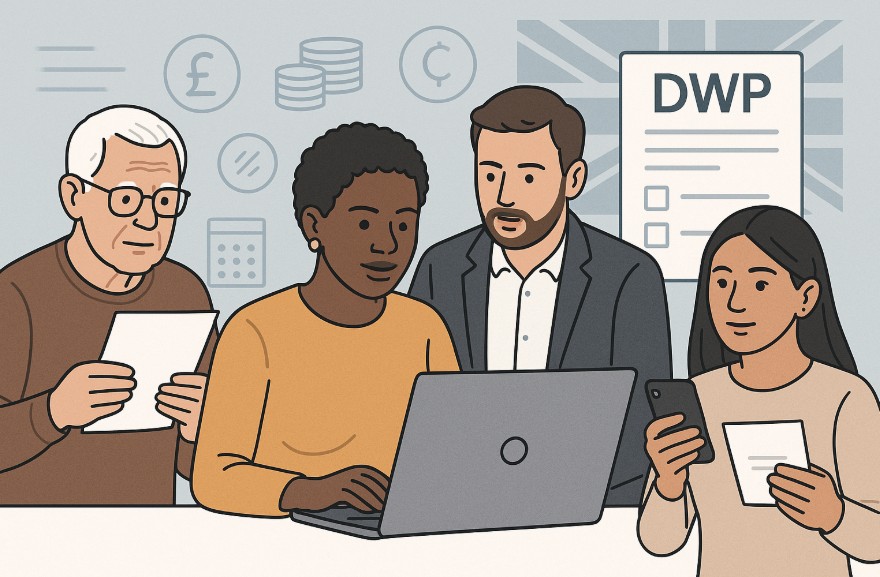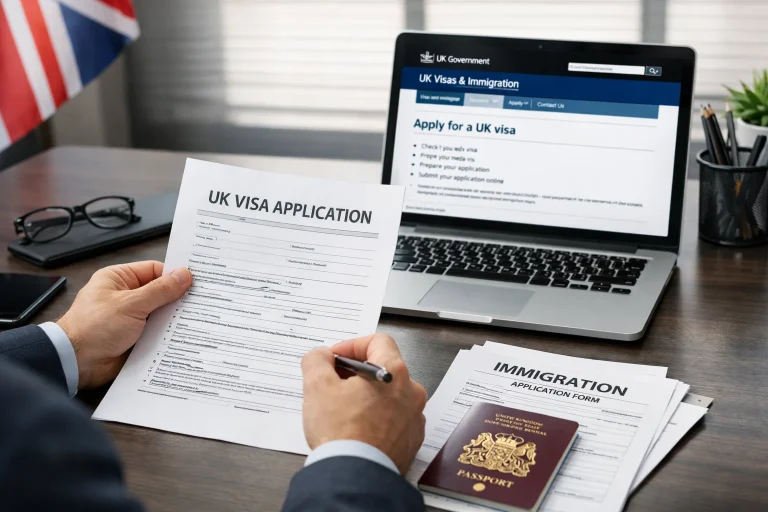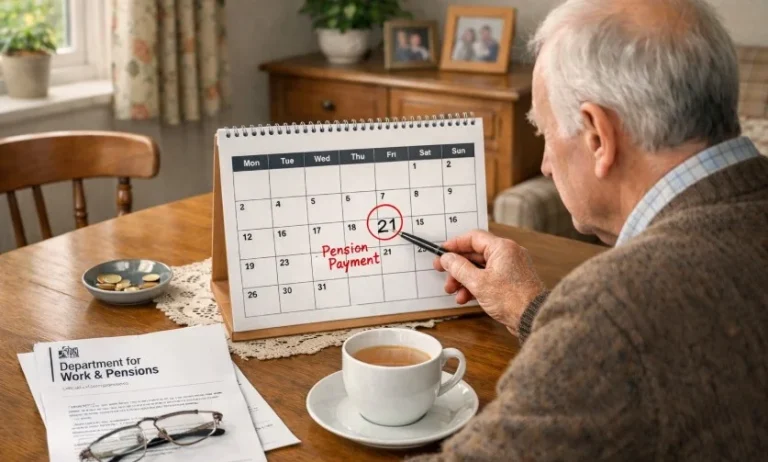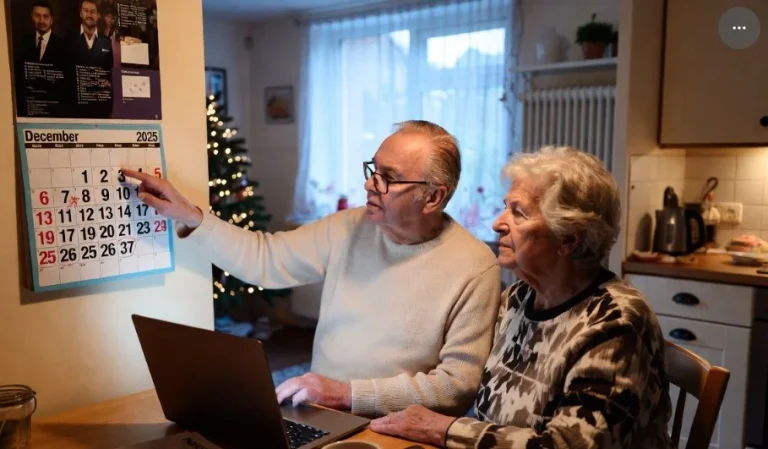The UK government has introduced a series of Cost of Living Payments to support individuals and families facing financial challenges.
These payments, managed by the Department for Work and Pensions (DWP) and HMRC, aim to ease the burden of rising living expenses.
Understanding who qualifies for these payments and how they are distributed is essential for anyone receiving benefits.
This guide outlines DWP Cost of Living Payments eligibility and how to check if you meet the criteria.
What Are DWP Cost of Living Payments and Who Provides Them?

The Department for Work and Pensions (DWP) and HM Revenue and Customs (HMRC) administer Cost of Living Payments to help eligible UK residents cope with increasing household expenses. These payments are non-taxable and do not affect existing benefit or tax credit entitlements.
DWP primarily handles payments for people receiving means-tested benefits, including Universal Credit, Pension Credit, and Employment and Support Allowance (ESA).
HMRC processes payments for people receiving tax credits only. Payments are typically issued automatically to eligible claimants, so there is no need to apply.
Who Is Eligible for DWP Cost of Living Payments in 2025?
To receive a DWP Cost of Living Payment in 2025, individuals must be receiving one or more of the qualifying benefits during specified eligibility periods set by the UK government.
These payments are designed to support low-income households, vulnerable individuals, and those facing financial hardship due to the ongoing effects of rising living costs.
Qualifying Benefits for 2025
The eligibility for Cost of Living Payments is primarily based on being entitled to any of the following means-tested benefits:
- Universal Credit: Claimants must have received a payment (or been eligible for one) during the designated qualifying assessment period. This includes people in work and on a low income, or those out of work and meeting eligibility conditions.
- Income-based Jobseeker’s Allowance (JSA): Only those on the income-based version of JSA qualify. If you’re on the new-style or contribution-based JSA only, you will not be eligible.
- Income-related Employment and Support Allowance (ESA): Individuals receiving income-related ESA qualify, but those only on contribution-based ESA or new-style ESA do not.
- Income Support: This legacy benefit continues to make some individuals eligible, particularly those who have not yet migrated to Universal Credit.
- Pension Credit: Both Guarantee Credit and Savings Credit elements can make you eligible, depending on whether you met the requirements during the qualifying period.
- Child Tax Credit and Working Tax Credit: Managed by HMRC, tax credits also qualify, but only if you’re not receiving other benefits from DWP. If you receive both tax credits and a DWP benefit, your payment will usually be made by DWP.
It’s important to note that individuals must have received a benefit payment, or at least had entitlement for one penny or more during the specified period. Even if a payment wasn’t actually made because of deductions or adjustments, you may still be eligible as long as you met the entitlement threshold.
Non-Qualifying Situations
Not all benefits count towards eligibility. You will not receive a Cost of Living Payment if:
- You only received new-style JSA, new-style ESA, or contributory ESA with no income-based element
- Your benefit entitlement was reduced to £0 (nil award) during the qualifying period, unless it was due to deductions for debts or hardship payments
- You didn’t receive your benefit payment during the eligibility window
- Your tax credits entitlement was below £26 for the tax year
Key Considerations for 2025
- Automatic Payments: If you’re eligible, the payment is made automatically. You do not need to apply or fill in any forms.
- Backdated Awards: If your benefit was awarded after the qualifying period but backdated to cover it, you should still receive the payment automatically.
- Changes in Circumstances: Changes in income, living arrangements, or savings could affect whether you qualify for a payment, particularly with means-tested benefits like Universal Credit or Pension Credit.
Summary of Eligibility by Benefit Type
| Benefit Type | Eligible for 2025 Payment |
| Universal Credit | Yes |
| Income-based Jobseeker’s Allowance (JSA) | Yes |
| Income-related Employment and Support Allowance (ESA) | Yes |
| Income Support | Yes |
| Pension Credit | Yes |
| Child Tax Credit | Yes (if not receiving DWP benefits) |
| Working Tax Credit | Yes (if not receiving DWP benefits) |
| New Style ESA / JSA only | No |
| Contributory ESA / JSA only | No |
Understanding which benefits count—and under what conditions—is essential for confirming eligibility. Anyone unsure about their entitlement should monitor their official benefit accounts and check communications from DWP or HMRC during the payment windows.
When Will You Receive the Cost of Living Payments?
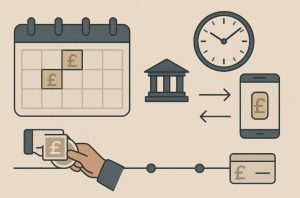
Cost of Living Payments have been issued in several instalments from 2022 to 2024. Payment dates vary depending on the type of benefit and the eligibility period. Below is a detailed table for Universal Credit recipients, which is one of the most common qualifying benefits.
| Payment Amount | Eligibility Period | Payment Dates |
| £299 | 13 November – 12 December 2023 | 6 February – 22 February 2024 |
| £300 | 18 August – 17 September 2023 | 31 October – 19 November 2023 |
| £301 | 26 January – 25 February 2023 | 25 April – 17 May 2023 |
| £324 | 26 August – 25 September 2022 | 8 November – 23 November 2022 |
| £326 | 26 April – 25 May 2022 | 14 July – 31 July 2022 |
For other benefits like income-based JSA, ESA, Income Support, and Pension Credit, the payment windows are similar. Tax credits follow a slightly adjusted schedule, managed by HMRC.
Some individuals may experience delayed payments if their benefits were awarded after the qualifying period or if they changed their payment account.
How Can You Check If You Qualify for DWP Cost of Living Payments?
Eligibility confirmation is usually automatic, but there are ways to verify:
- Review the benefit payment history and check if it falls within the qualifying periods
- Log into your DWP or HMRC online portal and examine your award notices
- Consult official government sources or contact the benefit office directly if uncertain
While there is no specific eligibility checker tool provided by DWP, the official GOV.UK website maintains updated guidance. If you are unsure, checking your Universal Credit or tax credit portal is the most direct way to confirm your eligibility.
Why Might You Not Be Eligible for Cost of Living Support?
There are various reasons someone may not qualify for a Cost of Living Payment, even if they are on benefits. A common disqualification is receiving a ‘nil award’ during the assessment period, which means no benefit payment was issued.
Typical causes of nil awards include:
- Receiving multiple income payments within the assessment period
- Increased earnings or savings pushing you over the threshold
- Receiving another non-qualifying benefit during that time
- Sanctions due to failing claimant commitments
However, exceptions apply if a claimant’s benefit was reduced to zero because of deductions, such as repayments for rent or debt, or if they received a hardship payment.
What About Cost of Living Payments for Tax Credit Claimants?

If you were not receiving any DWP benefit but were on Working Tax Credit or Child Tax Credit, you may still be eligible through HMRC. Payments are made based on tax credit entitlement on specified dates.
If you received both Child Tax Credit and Working Tax Credit, you are only eligible for one payment, typically via the Child Tax Credit claim.
| Payment Amount | Eligibility Period | Payment Dates |
| £299 | 13 November – 12 December 2023 | 16 February – 22 February 2024 |
| £300 | 18 August – 17 September 2023 | 10 November – 19 November 2023 |
| £301 | 26 January – 25 February 2023 | 2 May – 9 May 2023 |
| £324 | 26 August – 25 September 2022 | 23 November – 30 November 2022 |
| £326 | 26 April – 25 May 2022 | 2 September – 7 September 2022 |
If you qualified under both HMRC and DWP, you would only receive one payment, usually issued by DWP.
Are Disability Cost of Living Payments Handled Differently?
Yes, individuals receiving specific disability benefits on certain dates were entitled to separate Disability Cost of Living Payments. These were £150 per instalment and paid independently of income-based support.
Eligible benefits include:
- Disability Living Allowance (DLA) for adults or children
- Personal Independence Payment (PIP)
- Attendance Allowance
- Adult Disability Payment or Child Disability Payment (Scotland)
- Armed Forces Independence Payment
- War Pension Mobility Supplement
Disability payment windows were as follows:
- For entitlement on 1 April 2023: Payment issued between 20 June and 4 July 2023
- For entitlement on 25 May 2022: Payment issued between 20 September and early October 2022
These payments are also issued automatically and do not affect other support a claimant may receive.
Do Pensioners Get a Different Type of Cost of Living Payment?
Yes, pensioners who were eligible for the Winter Fuel Payment also received a Pensioner Cost of Living Payment. These payments were either £150 or £300, depending on the individual’s age and household situation.
The Winter Fuel Payment combined with the Pensioner Cost of Living Payment is issued annually to help pensioners cover heating and energy expenses during the colder months.
Payment amounts vary based on:
- Whether the person lives alone or with others also receiving the benefit
- Their age (e.g. over 80s may receive a higher amount)
- Whether they are claiming other benefits
Payments are typically made in November or December and do not require a separate claim.
What Should You Do If You Haven’t Received a Cost of Living Payment?
If you believe you were eligible but have not received a payment:
- Double-check the relevant payment windows and your benefit status during that time
- Review your bank statements to confirm whether the payment was deposited
- Contact the department that administers your benefits (DWP or HMRC) for clarification
It’s important to note that payments might be delayed if you recently started receiving benefits or updated your bank account information. You will still be paid automatically if you meet the qualifying conditions.
Are DWP Cost of Living Payments Taxable or Affecting Other Benefits?
Cost of Living Payments from DWP or HMRC are not taxable and do not affect the calculation of any other benefits or tax credits. They are considered separate from regular benefits and are treated as such for administrative purposes.
However, if a payment was made in error and you were not eligible, DWP or HMRC may contact you to arrange repayment.
How Do Joint Claims Affect DWP Cost of Living Payments?
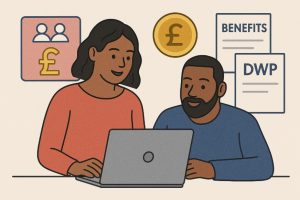
For households where a joint claim was made (such as a couple claiming Universal Credit), only one Cost of Living Payment is issued. It will be sent via the standard payment method used for that benefit during the qualifying period.
There is no duplication of payments within joint claims, and the amount remains the same as for individual claims.
How to Stay Updated on Future Cost of Living Payments?
The best way to stay informed about future payments is to:
- Visit the GOV.UK website regularly for official updates
- Subscribe to email notifications from DWP or HMRC
- Monitor your online benefits account
- Read official letters or notifications sent by DWP or HMRC
Updates are typically announced in advance of the payment windows, so regular monitoring of official channels can help avoid missing out.
Conclusion
DWP Cost of Living Payments are a critical support mechanism for those struggling with rising household expenses. Eligibility is primarily tied to your benefit status during specific qualifying periods, and payments are made automatically if you qualify.
Staying informed about payment windows, benefit status, and official updates can help you avoid missing out on support you’re entitled to. Always consult the official gov.uk website for the latest guidance and contact the relevant agency if you believe there’s an issue with your payment.
Frequently Asked Questions (FAQs)
What happens if I miss a qualifying date but get benefits later?
If your benefit award was backdated and you became eligible for the qualifying period later, you may still receive a delayed payment automatically.
Can I get both Disability and Low-Income Cost of Living Payments?
Yes, if you qualify for both, you can receive both payments. They are issued separately based on the corresponding benefit eligibility.
Do I need to apply for the Cost of Living Payment?
No, there is no application process. Payments are issued automatically to eligible claimants.
How do I know whether HMRC or DWP is issuing my payment?
If you only receive tax credits, HMRC issues your payment. If you receive benefits like Universal Credit, DWP is responsible.
Will these payments continue in 2026?
The government has not yet confirmed if the Cost of Living Payments will continue in 2026. Check gov.uk regularly for policy updates.
How are nil awards handled differently from suspended benefits?
Nil awards mean your entitlement was reduced to £0 during the assessment period. Suspended benefits due to investigation or sanctions may not qualify unless specifically exempt.
Can I challenge a decision if I was denied the payment?
Yes, you can contact the issuing agency for a review. Keep evidence of your entitlement and payment history.

